- Home
- Beverly Cleary
Ramona's World
Ramona's World Read online
CONTENTS
1. RAMONA SPREADS THE NEWS
2. THE ROLE MODEL
3. AT DAISY’S HOUSE
4. THE INVITATION
5. THE PRINCESS AND THE WITCH
6. THE PARTY
7. THE GROWN-UP LETTER
8. PEAS
9. RAMONA SITS
10. THE VALENTINE BOX
11. BIRTHDAY GIRL
EXCERPT FROM HENRY HUGGINS
1. HENRY AND RIBS
ABOUT THE AUTHOR
BACK AD
OTHER BOOKS BY BEVERLY CLEARY
CREDITS
COPYRIGHT
ABOUT THE PUBLISHER
1
RAMONA SPREADS THE NEWS
Ramona Quimby was nine years old. She had brown hair, brown eyes, and no cavities. She had a mother, a father, a big sister named Beatrice who was called Beezus by the family, and—this was the exciting part—a baby sister named Roberta after her father, Robert Quimby.
“Look at her tiny fingernails,” Ramona marveled as she looked at the sleeping Roberta, “and her little eyebrows. She is already a whole person, only little.” Ramona couldn’t wait for the first day of school so she could spread the news about her baby sister.
That day finally came. It was a warm September day, and Ramona, neat and clean, with lunch bag in hand, half skipped, half hopped, scrunching through dry leaves on the sidewalk. She was early, she knew, but Ramona was the sort of girl who was always early because something might happen that she didn’t want to miss. The fourth grade was going to be the best year of her life, so far.
Ramona was first to arrive at the bus stop in front of Mrs. Pitt’s house. Mrs. Pitt came out the front door and began sweeping her front steps.
“Hi, Mrs. Pitt,” Ramona called out. “Guess what! My baby sister is two months old.”
“Good for her,” said Mrs. Pitt, agreeable to a baby in the neighborhood. Babies did not scatter candy wrappers or old spelling papers on the lawn in front of her house.
Ramona pretended she was playing hopscotch until her friend Howie, who was already familiar with Roberta, joined her along with other children, some with their mothers, who were excited about the first day of school. “Hi, Ramona,” he said, and leaned against a tree in the strip of grass between the sidewalk and the street. He opened his lunch bag and began to eat his sandwich. Ramona knew he was doing this so he wouldn’t be bothered carrying his lunch.
“Little boy!” Mrs. Pitt called out. “Little boy, don’t you drop any papers or orange peels in front of my house. And stay off my grass!”
“Okay.” Howie took another bite of his sandwich as he moved to the sidewalk. Howie was not easily excited, which Ramona sometimes found annoying. She was often excited. She liked to be excited.
When the yellow bus stopped, Ramona was first on board. She plunked herself down on a seat across the aisle from another fourth grader, a boy named Danny who was wearing a white T-shirt with Trail Blazers printed on it. Ramona called him Yard Ape because she thought he acted like an ape on the playground. She was glad he had not moved away during the summer. “I have a new baby sister,” she informed him.
Yard Ape closed his eyes and hit his forehead with the palm of his hand. “Another Ramona,” he said, and groaned.
Ramona refused to smile. “You have a little brother,” she reminded him.
“I know,” answered Yard Ape, “but we just keep him for a pet.”
Ramona made a face at him so he wouldn’t know she liked him.
When Ramona jumped off the bus at Cedarhurst School, she greeted old friends, most of them in new, or at least clean, clothes for starting the fourth grade. When she saw Janet, whom she had often seen in the park during the summer, the two girls compared calluses on the palms of their hands. “Your calluses are really big,” said Janet, impressed.
It was true. Ramona’s calluses were hard and yellow because she lived close to the park, where she often went with Beezus and her mother and Roberta on warm summer days. She worked hard at the rings—pump, pump, swing, pump, pump, swing—and by the end of summer she was able to travel down the line of rings and back again.
“There’s Susan,” cried Janet, and ran to join her. Reluctantly Ramona followed. “Hi, Susan,” she said, eyeing Susan’s short blond curls.
“Hi, Ramona,” answered Susan. Neither girl smiled. The trouble was the grown-up Quimbys and Susan’s parents, the Kushners, were friends. Ramona did not know what Mrs. Kushner said, but her own parents often said things like, “Now, you be nice to Susan.” “Susan is such a well-behaved little girl,” or “Susan’s mother says Susan always sets the table without being asked.” Such remarks did not endear Susan to Ramona. There was more. In kindergarten Susan did not like Ramona, who could not resist pulling the long curls she had at that time and saying, “Boing!” as she released them. In first grade, when the class was making owls out of paper bags, Susan copied Ramona’s owl. The teacher held up Susan’s owl to show the class what a splendid owl Susan had made. This seemed so unfair to Ramona that she crunched Susan’s owl and found herself in trouble, big trouble. So how could anyone expect the two girls to be friends? As Ramona expected, the calluses on Susan’s hands were so small they could scarcely be seen.
Then Ramona saw a new girl who was standing alone. A new fourth grader, Ramona decided, and because she admired the girl’s long fair hair she went over to her and asked, “What’s your name?”
“Daisy,” answered the girl. “Daisy Kidd.” When she smiled, Ramona saw that she was wearing bands on her teeth. “What’s your name?” Daisy asked. As Ramona told her, the bell rang, ending their conversation.
On her way to the fourth grade Ramona passed her former classroom, where the teacher was standing outside the door welcoming her new class. When she saw Ramona, she waved and said, “How’s bright-eyed, bushy-tailed Ramona?” People often called Ramona bright-eyed and bushy-tailed. When she was younger, she blinked her eyes, held up her hands like paws, and wiggled her bottom as if she were wagging a tail. Now that she was a fourth grader, she was too grown up for such babyishness, so she waved and said, “Hi, Mrs. Whaley.”
Ramona’s fourth-grade teacher was Mrs. Meacham, a plump, cheerful woman in a green pantsuit and blouse printed with flowers, a good sign. Ramona liked teachers who wore bright cheerful clothes. Mrs. Meacham, Ramona decided, must be very old, because Howie’s father had gone to school with her when he was a boy.
After inspecting her new teacher, Ramona looked at the chalkboard for spelling words. The board was blank, another good sign. Mrs. Meacham passed out name tags and made a little speech about how learning was fun in the fourth grade and everyone should work together to make this a great year. She then passed out papers with borders of dinosaurs, another hopeful sign, Ramona thought, even though dinosaurs were more for third graders than fourth graders. Mrs. Meacham said, “So I will get to know you better, I want each of you to write a paragraph telling me about yourself.”
Ramona tapped her pencil on her nose and noticed that Yard Ape, who sat across the aisle, was already writing, apparently without having to think. Susan, in front of Ramona, leaned her head on her fist. A boy went to the pencil sharpener. Someone sighed. Feet shuffled. Ramona began to write. She enjoyed writing in cursive because her third-grade teacher once said, “Ramona, your cursive is better than mine.” Now she wrote fast because she had so much to say: “My name is Ramona Quimby. I have a baby sister. She is cute. She screems if she is hunrgy.” Ramona paused. Screems looked peculiar. Maybe it was spelled with ea instead of ee. Oh, well. Anyone would know what she meant. She had so much to say she did not want to waste time spelling. “Sometimes I sit on the coach and hold her.”
Ramona enjoyed writing. Her face grew f
lushed as she wrote faster and faster toward the dinosaurs at the bottom of the page. Her last lines, not as neat as her first, were written across the dinosaur heads. “She can grab my figner. Mother says I used to look like her. She says I can be her roll modle.” Ramona squeezed a tiny sketch of a baby’s sleeping face between a brontosaurus and a tyrannosaurus.
Ramona was proud of her work. She glanced around to see what her classmates had written about themselves. She leaned forward to look over Susan’s shoulder. Susan had written half a page in neat cursive and was busy coloring dinosaurs, neatly of course, with crayons. Ramona read, “My name is Susan. My favorite color is blue. My favorite food is . . .” Ramona did not need to read any further. She half rose from her seat to look across the aisle toward Yard Ape and read in his neat uphill cursive, “My name is Daniel. Call me Yard Ape. I am nine years old. I am not married. I am a kid and proud of it.”
Me too, thought Ramona, filled with admiration for Yard Ape, a smart boy who always earned stars or Good Work! at the top of his papers and looked as if he was about to get into trouble. Somehow he never did, not in the classroom. On the playground he ran faster, yelled louder, and kicked balls farther than any of the other boys.
“All right, class,” said Mrs. Meacham, “pass your papers to the front.” Ramona was so pleased with her work she was almost sorry to part with it.
At lunchtime when the class went to the multipurpose room, Daisy sat down beside Ramona. “Okay if I sit here?” she asked.
“Sure,” said Ramona. Together the girls tore open their lunch bags. They shared Ramona’s corn chips and each ate half of Daisy’s brownie. Ramona told Daisy about Roberta; Daisy wished she had a little sister. She only had a big brother. Ramona admired Daisy’s long blond hair; Daisy admired Ramona’s short hair and said she was lucky to have hair that didn’t get tangled when it was washed. It was a good beginning.
After lunch Mrs. Meacham said, “I’ve had time to look over what you have written. There is one description I would like to read to you.”
Mine! Mine! Ramona silently prayed, and sure enough, it was Ramona’s description of Roberta that her teacher chose to read. Mrs. Meacham did not seem to notice a few misspelled words, because she knew what Ramona meant. The class seemed to enjoy it, and Ramona was ecstatic. She couldn’t wait to tell her mother.
The rest of the day passed quickly. Ramona ran all the way home from the bus and found her mother sitting on the couch drinking tea and reading a book for her book club, which met once a month. “Guess what!” Ramona burst out. “I wrote a composition about Roberta.”
“Sh-h-h. Roberta’s asleep.” Mrs. Quimby placed a marker in her book and closed it. “Sounds interesting,” she said, and took a sip of tea.
“It was,” whispered Ramona. “It was so interesting that Mrs. Meacham read it to the whole class. Mrs. Meacham is about a million years old, but she’s nice.”
“I can’t wait to read your composition,” said her mother.
Ramona frowned thoughtfully. “I suppose I could have said Roberta spits up sometimes.”
“We don’t have to tell the whole world our little secrets.” Mrs. Quimby looked amused, which Ramona found pleasant, not like being laughed at. Mrs. Quimby sipped her tea.
It was a moment for confidences. Ramona told her mother, “There’s a new girl named Daisy Kidd with bands on her teeth and long golden hair like a fairy princess and a brownie in her lunch. I know I am going to like her a lot.”
“Good. She sounds nice,” said Mrs. Quimby.
Ramona picked up her mother’s book. Moby Dick. “What’s this about?” she asked.
“A whale that bit off a man’s leg,” said Mrs. Quimby. “Our book club decided to read a book we had all heard about all our lives but had never actually read.”
“Sounds exciting.” Ramona opened the book, which turned out not to look exciting at all. The print was small, the lines were close together, and there were almost no quotation marks. She closed the book. She liked her own writing better. That wasn’t all she liked. She liked Mrs. Meacham, she liked Daisy, she liked Yard Ape, she liked the fourth grade. It was going to be a great year.
2
THE ROLE MODEL
The next morning Ramona was excited and happy when she entered her classroom, that is, until she saw—she might have known—spelling words on the chalkboard. She mentally groaned. Why did nice Mrs. Meacham have to do this? She soon found out.
Mrs. Meacham explained. “Today we are going to study words we use. When we wrote about ourselves, we discovered words we need to learn how to spell.”
Ramona looked more closely at the words on the chalkboard. Among them she saw scream, hungry, couch, finger, role, model. They looked familiar. They were familiar. They were her words. She scowled.
“Is something the matter, Ramona?” asked Mrs. Meacham, who had been quick to learn names.
Ramona decided to speak up. “What difference does spelling make if people know what you mean?” she asked.
“You wouldn’t want people to think you sat on a coach instead of a couch, would you?” Mrs. Meacham asked.
The class found this funny, but Ramona did not, not when the class laughed. She felt her face grow hot. She slid down in her seat and shook her head. Mrs. Meacham knew the answer. Why did she bother to ask?
Mrs. Meacham continued, “And before lunch are you hungry or hunrgy?”
The class laughed, harder this time. The warm day suddenly seemed warmer. Ramona decided right then that she did not like Mrs. Meacham, and this was only the second day of school. Mrs. Meacham did not tell the truth. She said learning was fun, and it wasn’t. At least not all the time. Not when it came to spelling.
The fourth grade suddenly began to stretch ahead, long and dreary and full of spelling. Before long, rain would begin to fall, day after day. The school bus would smell like old boots. Then, with luck, snow might fall. Ramona imagined herself making snow angels in the front yard.
“Ramona, please join the class.” Mrs. Meacham spoke sharply. The class laughed a third time.
Ramona sat up and stared glumly at the spelling words on the chalkboard. She did not really want to be a bad speller. She simply did not want to bother being a good speller. She had more interesting things to do, although at the moment she couldn’t think what. She frowned and studied the words based on her own misspellings as well as those of others and disliked every minute. Mrs. Meacham gave a little talk on not confusing h with k in cursive writing and pointed to muck on the chalkboard. Ramona knew much was not her word but that of some babyish person in the class. Imagine spelling it muck. How silly.
When recess came, Yard Ape stopped chasing a ball to ask, “What kind of coach did you sit on? Baseball or football?”
“You keep quiet.” Ramona saw no reason to be polite, especially when the day was so warm. Then she had an inspiration. “I sat on a coach like a stagecoach,” she informed him. She could tell he didn’t believe her.
Susan smiled that superior smile of hers and said nothing.
“Everybody makes mistakes,” Janet reminded Ramona.
“I’m a rotten speller, too,” said Howie, as if that would help.
Daisy smiled, showing the bands on her teeth, and said, “I don’t think Mrs. Meacham was very nice to you.” Ramona felt better.
When the long day finally ended, Ramona sat as far as she could from Yard Ape on the bus. She gave ever-sweeping Mrs. Pitt a tiny smile and did not bother to wave. At home she found her mother sitting on the couch, not coach, still reading Moby Dick.
“Sh-h-h,” said Mrs. Quimby. “Don’t wake Roberta. She was fussy last night and the heat makes her cross.” She laid her book aside. “What happened in school today?”
Ramona was in no mood to be hushed. “Oh—nothing much. Same old stuff. Spelling and multiplication facts and stuff.” Then, because her mother often told her to look on the bright side, she added, “Daisy gave me half of her chocolate-chip cookie.”
“That’s good.” Mrs. Quimby spoke as if she was thinking of something else. “Ramona,” she said in that quiet voice that meant Ramona was about to get a little talking-to, “you’ve been using the word stuff entirely too much. Surely you can find a better word to say what you mean.”
Ramona felt picked on, first by her teacher and now by her mother. Stuff was a perfectly good, handy, multipurpose word and easy to spell, too. She flopped into a chair and scowled. If she had written, “My sister is cute and stuff,” or “I like to hold her and stuff,” she wouldn’t have misspelled so many words, and Mrs. Meacham wouldn’t have had a chance to be so mean.
Before the discussion could continue, Beezus came home from school, dumped an armload of books on the dining room table, and gave her mother and sister a cheerful “Hi.”
Ramona returned it with a grumpy “Hi.”
Beezus, smiling and full of enthusiasm, perched on the arm of the couch. “I love high school. I didn’t get lost in the halls even once today. I think I made a new friend. My French teacher makes French seem easy, and I have the nicest man teacher for English, and—”
Ramona interrupted. “And I suppose you spelled every single word right.”
“Well, aren’t you Miss Grouchypuss?” Beezus said. “Yes, I did, and in French, too.”
“Smartypuss,” countered Ramona, feeling that everyone picked on her.
“Girls!” Mrs. Quimby’s voice was weary. The afternoon was too warm for this sort of disagreement. From the bedroom came the sound of fussing, crying, and finally screaming.
S-c-r-e-a-m, thought Ramona, mentally spelling the word in spite of herself.
“I’ll get her,” Beezus offered.
Good old Beezus, thought Ramona, sliding farther down in the chair.
“Ramona, please,” said Mrs. Quimby. “Try to be agreeable.”
“I am agreeable,” said Ramona with an even darker scowl.
Beezus returned with sobbing Roberta in her arms. Because of the heat the baby was wearing only a diaper. “What’s the matter with Roberta?” Beezus crooned, and kissed the baby’s hair.

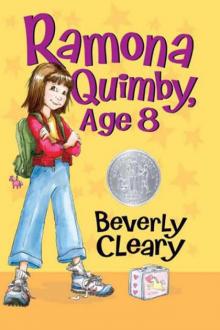 Ramona Quimby, Age 8
Ramona Quimby, Age 8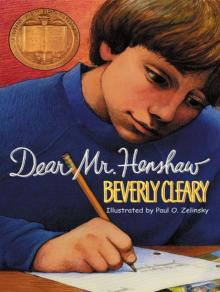 Dear Mr. Henshaw
Dear Mr. Henshaw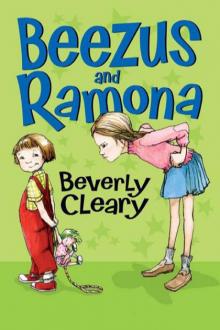 Beezus and Ramona
Beezus and Ramona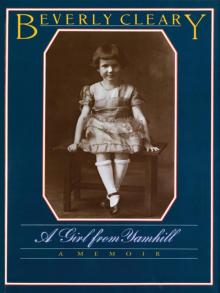 A Girl from Yamhill
A Girl from Yamhill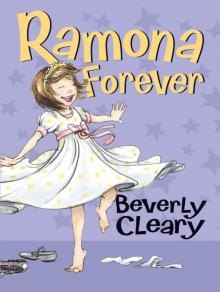 Ramona Forever
Ramona Forever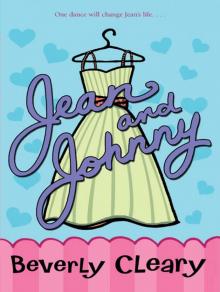 Jean and Johnny
Jean and Johnny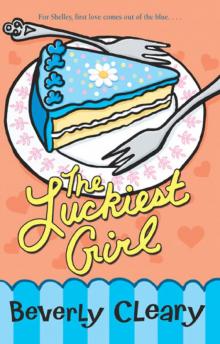 The Luckiest Girl
The Luckiest Girl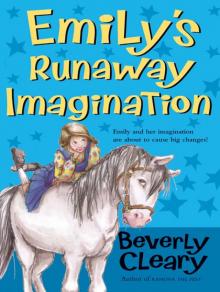 Emily's Runaway Imagination
Emily's Runaway Imagination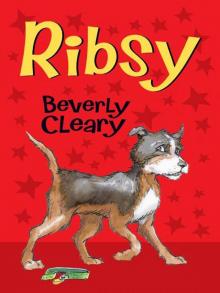 Ribsy
Ribsy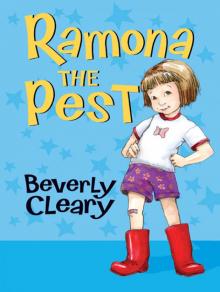 Ramona the Pest
Ramona the Pest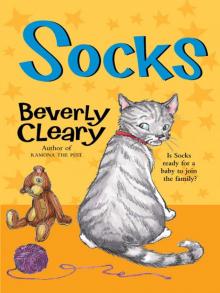 Socks
Socks Ramona's World
Ramona's World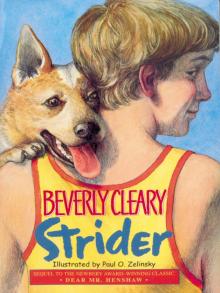 Strider
Strider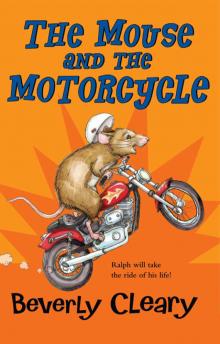 The Mouse and the Motorcycle
The Mouse and the Motorcycle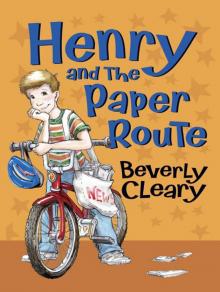 Henry and the Paper Route
Henry and the Paper Route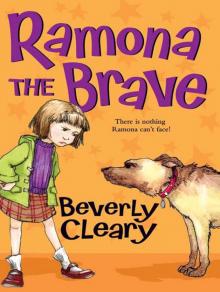 Ramona the Brave
Ramona the Brave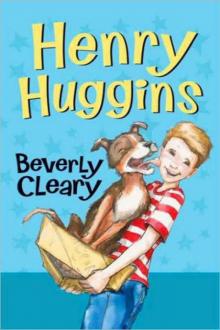 Henry Huggins
Henry Huggins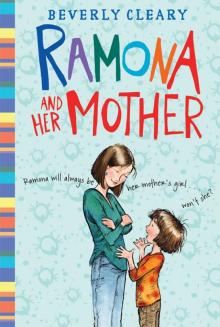 Ramona and Her Mother
Ramona and Her Mother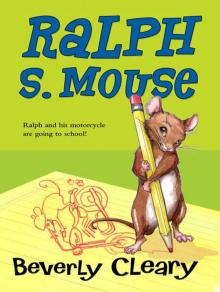 Ralph S. Mouse
Ralph S. Mouse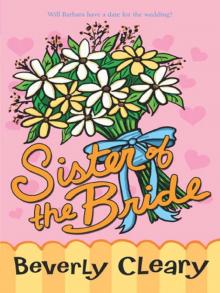 Sister of the Bride
Sister of the Bride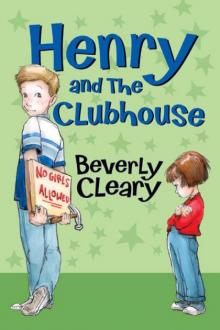 Henry and the Clubhouse
Henry and the Clubhouse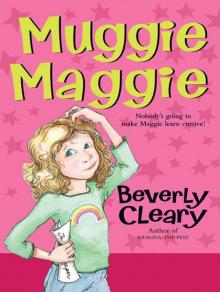 Muggie Maggie
Muggie Maggie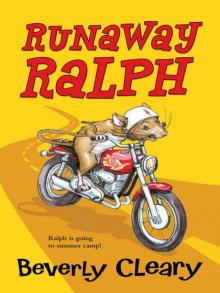 Runaway Ralph
Runaway Ralph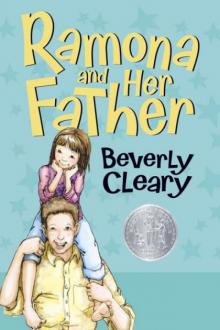 Ramona and Her Father
Ramona and Her Father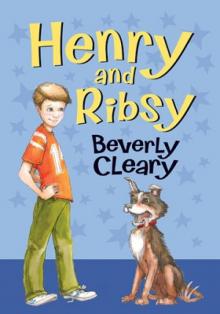 Henry and Ribsy
Henry and Ribsy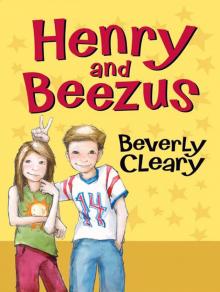 Henry and Beezus
Henry and Beezus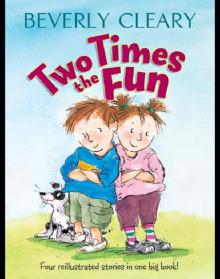 Two Times the Fun
Two Times the Fun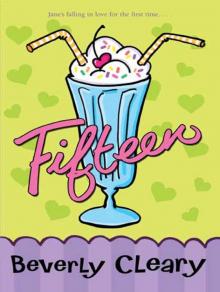 Fifteen
Fifteen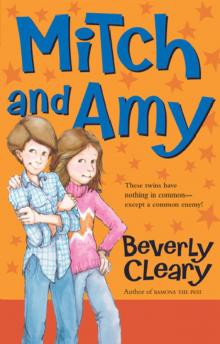 Mitch and Amy
Mitch and Amy